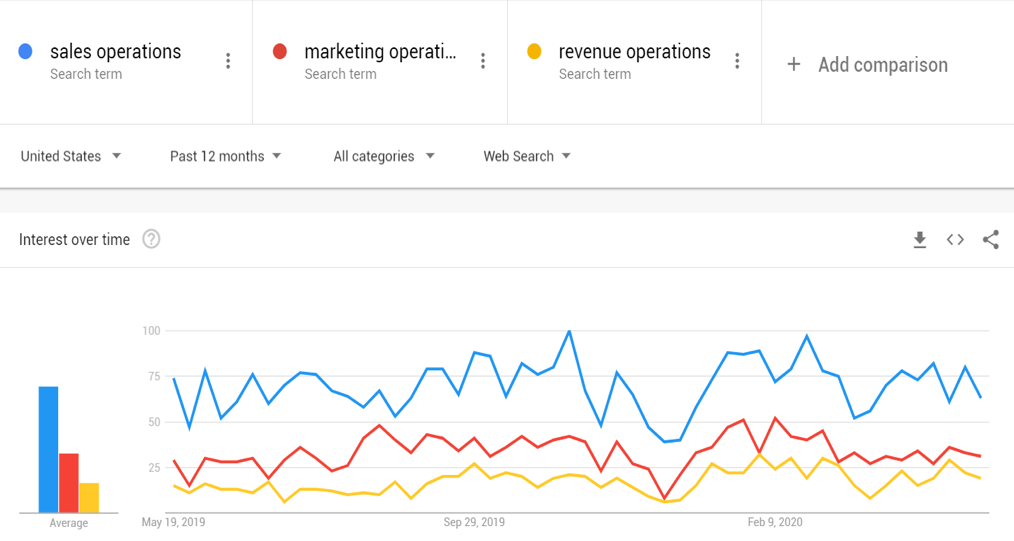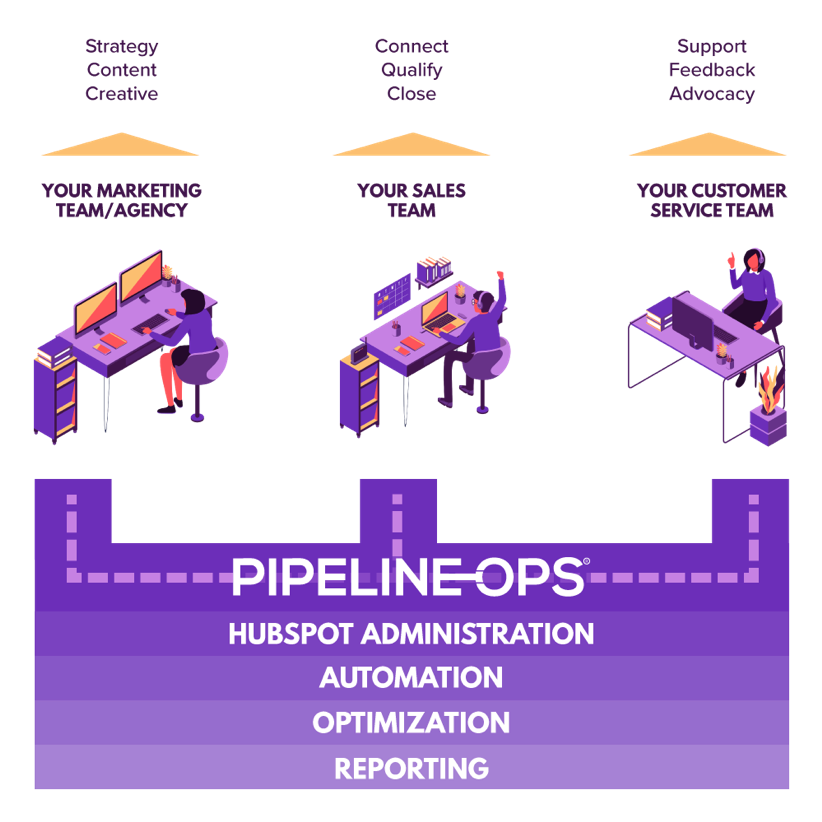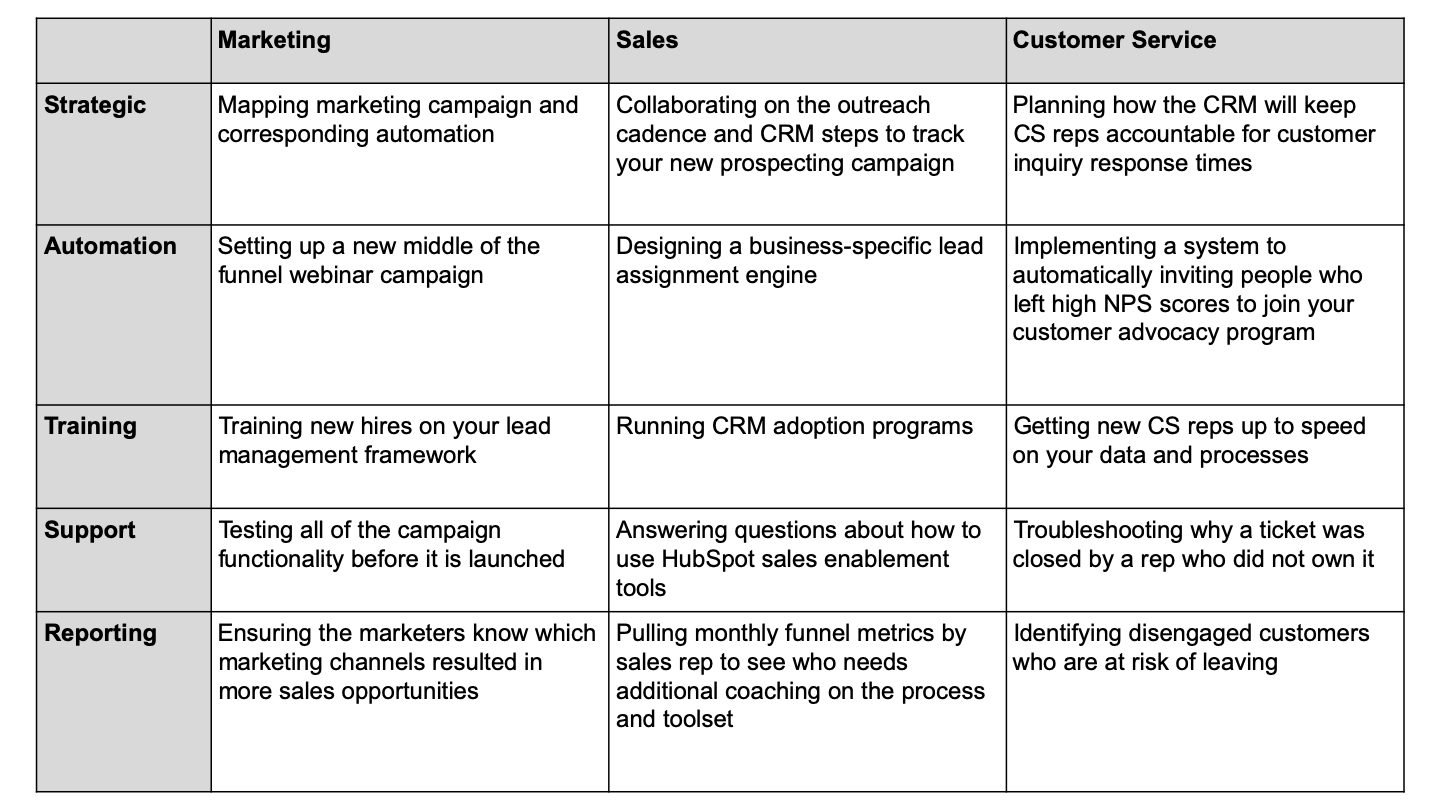I still remember the day that I realized that I was not running a marketing agency.
My team was very good at creating content and generating leads, but we did not have the interest or structure to do it in an agency model.
Our most successful clients leveraged my team to develop complex sales and marketing automation and implement business-specific lead management frameworks. To optimize the post-sales stages of the customer journey, we automated processes, accountability, and reporting in the delivery of products and services once somebody became a customer.
The problem was that all of that was a mouthful. This description does not fit on a business card and it made a very poor tag line for my company.
A large portion of how we help businesses falls under sales operations definitions. According to Wikipedia, “Sales operations is a set of business activities and processes that help a sales organization run effectively, efficiently, and in support of business strategies and objectives.”
However, I was stuck when it came to conveying our advanced marketing operations and customer success automation expertise.
I wrestled with this for several years. I reached out to my contacts at tech companies like HubSpot. I tapped my network looking for help in succinctly describing what we do. People enjoyed the challenges, but I didn’t have any luck finding clarity.

The Problem With Revenue Operations
It was not long after that I was having dinner with a friend and I described my frustration. He casually said, “It sounds like you provide RevOps (revenue operations) services.”
I had not heard the term widely used before, so I dug deep into revenue operations and its role in companies. Low and behold, it was a perfect description of how we support HubSpot customers. We were a RevOps agency!
However, there was a problem. Just like me, very few people have a workable understanding of revenue operations, its value, and where it fits into their business.
Ultimately, we re-branded our firm a “CRM and sales optimization” agency since these descriptors have more meaning to our target audience. People can anchor terms they are familiar with to how this role fits into their understanding of their business. RevOps was just not there yet.
Our plan is to educate people on revenue operations over time and adjust our marketing as “RevOps” gains meaning in the minds of executives.
Since I began building my agency around revenue operation services, the term has risen in use and understanding within the business community (and more importantly for my business, the HubSpot community).
FREE DOWNLOAD: 9 Mistakes People Make When Trying to Increase Sales Using the HubSpot CRM
To further help people understand this important function in their business, the following article will provide a clear, actionable definition for RevOps.
I have been researching and testing different definitions for the past 12 months. I can’t promise that this definition won’t evolve as RevOps evolves. However, my goal is to give clarity to executives so that they don’t miss holes in their growth plan, as well as provide them with the organizational language to generate more revenue at every point in the customer journey.
How to Define and Describe Revenue Operations (RevOps)
While my agency provides revenue ops expertise and consulting, the terms marketing automation, CRM implementation, sales process optimization, CRM adoption, and sales and marketing alignment are much more defined and well-known in the market.
That began my journey to define revenue operations in a way that made sense to the average executive.
The first step in having clarity around RevOps and where it fits into your organization is understanding “operations.” You may have heard of sales ops or marketing ops already, but revenue ops might be a newer term.

To add to the confusion, “ops” roles mean very different things to different companies. While the specific of sales, marketing, or customer service operations vary widely, the definitions come together around the following core functions:
- They customize software systems for your specific business.
- They plan, develop, and maintain automation.
- They are responsible for accurate and actionable reporting.
- They train people in the trenches, as well as their managers, on how to get the most from the technology.
- They help roll out new tools and features.
- They are the first line of support for end users and managers inside your company.
With the sizable increase in revenue operations roles over the past couple of years, it is common to define revenue operations as the combination of sales operations, marketing operations, and customer service operations under one individual or team. This unified approach creates strategic cohesiveness and operational efficiency across all phases of the customer journey.
This makes sense, but it feels like a “cop out” definition for RevOps. You can’t add clarity to the discussion around revenue ops if you define it with terms and titles that need their own definitions.
As I already pointed out, while “sales ops,” “marketing ops,” and “customer service ops” have been around for over a decade, many executives still don’t have a concrete understanding of these roles.
While my earlier definition of revenue operations is part of the answer, it does not provide enough clarity to executives and other decisions makers.
Defining RevOps needs to pass the “cocktail party” test. When someone asks what you do, you need to be able to explain it in a way that does not produce blank stares.
Such a vast role that impacts so many parts of the business creates definitional problems if you don’t tie it to functions and goals that people are already familiar with. The following definition for revenue operations covers both the expansiveness of the role and the need to anchor it to your existing business.
How to Describe Revenue Operations
Your revenue operations team turns your marketing team’s content and creative, your sales team’s passion and persistence, and your executive team’s ideas and strategy into consistent and reliable revenue.
Here is how we illustrate it for our clients:

Is RevOps Strategic or Tactical?
Most people view revenue operations through the lens of operational efficiency. While it is one of the most important functions of revenue operations, if you stop there, you are leaving money on the table.
Revenue operations are the architects of how your marketing, sales, and customer delight strategies are operationalized in the most long-term and scalable way (with minimal downtime and disruption to current business operations).
My team is brought into our client’s growth discussions at the strategy stage for three main reasons.
- Crystal Ball. Your revenue operations team can see six months down the road so that the implications of today’s decisions avoid pitfalls and/or capitalize on opportunities faster.
- Utilization. Your revenue operations team is deeply familiar with all of the tools and features you have available to grow your business, as well as how to take advantage of new functionality.
- Connecting the Dots. Your revenue operations team understands the goals, user experience, and behind the scenes data of every step in your customer journey.
This unique value in your organization fills important gaps where business stakeholders in sales, marketing, IT, and customer departments don’t have visibility and experience.
If my company took a more reactive operational efficiency role, we would often be stuck optimizing systems that were not set up correctly in the first place. In the best case, it would take longer to support our clients and the client would not be able to fully take advantage of the tool sets they have invested in. In the worst case, you could see major data corruption issues, frustrated marketers or sales reps, and lost revenue.
RevOps Example
To illustrate where revenue operations fits into your business, let’s look at a typical week of work from your revenue ops team or agency:
Monday: The Operational Side of Planning
Collaborate on constructing a new webinar campaign to ensure that all of the targeting, personalization, and automation are mapped out.
Tuesday: Sales and Marketing Automation
Test a new chatbot that will increase sales opportunities for a specific product.
Wednesday: Training of Systems and Processes
Train new sales reps that started on Monday so that they can get up and running faster.
Thursday: Support and Troubleshooting
Dig into the lead assignment automation to find out why a lead that was in discussions with a sales rep was reassigned overnight.
Friday: Reporting
Prepare a set of ad hoc customer satisfaction reports that validate the CEO’s assumptions for next week’s board meeting.
What Types of Tasks Fall Under Revenue Operations?
Since revenue operations is responsible for making sure every stage of the customer journey is running smoothly and optimized to increase revenue, RevOps encompasses a wide range of tasks. Here are just few tasks from recent revenue operations job descriptions:
- “Collaborate with sales, customer success, marketing, and finance teams to design and drive scalable revenue operations solutions that support go-to-market strategies.”
- “Partner in decisions about key elements of sales automation, including managing complex CRM business workflow optimization and CPQ integration processes.”
- “Participate in the planning and analysis of business requirements for system changes and enhancements.”
- “Be the first responder in assisting our sales, finance, and customer success teams in CRM-related questions.”
- “Design, build, and maintain revenue operations process plans and documentation, including standard operating materials and deployment schedules.”
- “Execute against the processes established in support of revenue goals and program objectives, while meeting time and service level expectations.”
- “Collaborate with the Director of Integration to develop single-platform standardized reporting, workflow, and delivery expectations.”
- “Prepare regular reporting packages on financial and operational performance for presentation to senior leadership.”
- “Support daily/weekly/monthly operational reporting and executive dashboards.”
- “Assist the sales and data teams with the development and implementation of sales, marketing, and company operation metrics, dashboards, and reports.”
- “Work closely and collaborate with sales leaders to define sales process/right metrics and visibility.”
- “Work closely with marketing to streamline marketing operations tasks and lead nurturing processes.”
- “Oversee the management and administration of sales technology stack.”
- “Monitor and continually seek improvements for Key Performance Indicators.”
In addition to covering a wide area of responsibility, your revenue operations group also reaches deep into the trenches of your technology platforms, as well as high up into the C-suite for items like monthly reports and assumption validation. See the matrix below.

How is the Success of Your Revenue Operations Team Measured?
One of the key ways that RevOps is different from sales ops or marketing ops is how goals are set. Traditionally, sales management sets the KPI for the sales ops team, marketing executives set the goals for the marketing ops team, and the customer support department manages the success metrics for the customer service ops team.
This works to a limited extent. Each operational function is tied to their department's piece of the revenue equation.
Revenue operations is responsible for the systems, processes, and automation that drives revenue - from awareness and lead generation to closed sales, customer onboarding, and turning customers into advocates.
When it comes to measuring the success of your revenue operations team or agency partner, your KPIs include those of traditional siloed operations teams. However, setting goals tied to every stage of the revenue cycle (across departments) provides an increase in effectiveness and accountability. This heightened level of productivity and awareness helps to avoid gaps in responsibilities, re-allocates resources more as necessary, and aligns departments that span the customer lifecycle.
The following are common metrics for measuring the success of your revenue operations team:
Leading Indicator Metrics
- System adoption (like CRM adoption)
- Funnel velocity
- Top of the funnel conversion rates
- Time to Response for new leads
- Customer satisfaction
Key Performance Indicator Metrics
- Revenue growth
- Customer lifetime value
- Bottom of the funnel conversion rates
- Customer retention
- Customer advocacy
You’ll often find that revenue operations specialists are not solely responsible for hitting these KPI goals. They share these goals with stakeholders in the marketing, sales, and customer success departments.
For instance, measuring the time it takes for a new sales rep to get up and running on working leads or target accounts depends on how effectively they are trained on both CRM processes and messaging.
As with most goals tied to revenue, there are milestones and granular steps that different people across your company are responsible for. Setting outcome-centric goals and expectations for your revenue operations team keeps them focused on the tasks that grow your business and promotes collaboration.
Where Does Revenue Operations Fit in Your Organization?
If you look at five different job postings for revenue operations roles, depending on the company, you might find the Director of Revenue Operations reporting to different people:
- One will report to the CEO.
- One will report to the Sales Director.
- One will report to the Chief Revenue Officer.
- One will report to the VP of Sales and Marketing.
- One will report to the CMO.
It is too early in the evolution of revenue operations roles to definitively place this team in your company. The chain of command will depend on a multitude of factors, like whether you have a CRO, how influential your marketing department is, and how many sales reps you have.
According to a study by Sirius Decisions, “46% of organizations in which revenue operations is a centralized function, that function reports to a CRO; 24% of those organizations indicated that it reports to a centralized operations leader (e.g. COO).”
If your revenue operations team is not reporting to your CRO or COO, the rule of thumb is to have revenue operations be part of the organization that is responsible for the most important steps in your revenue cycle.
- If you are more of a sales-centric organization, the revenue ops team will report up through the sales organization.
- If you are a marketing-driven revenue model, your revenue ops group will report to the head of your marketing department.
- If you derive most of your revenue on the back end, your revenue ops team might report to your VP of Customer Service.
Beware of having your revenue operations team too low in your organizational chart. One of the benefits of setting up a RevOps team or bringing in a revenue operations partner (rather than managing separate operations groups in each department), is their independence, broad expertise, and focus on revenue goals.
If you have the revenue ops team reporting to a Sales Director rather than the CRO or COO, your RevOps team's position in the organization will naturally limit their ability to make an impact.
Revenue Ops vs. Traditional Marketing/Sales/Customer Support Ops
If you have a technology stack that integrates multiple stand alone software platforms to individually handle marketing, sales and CRM functions, partner management, and customer success, chances are that you will set up siloed marketing ops, sales, ops, and customer support ops teams. It will be a slower move toward unifying these functions across the revenue cycle.
However, if your business pulls all of your sales, marketing, and customer service data from a single system, you are better off installing a revenue operations team to optimize, manage, and expand your revenue processes across all departments.
Revenue Operation Takeaway
Blending traditional sales ops, marketing ops, and customer service ops has made a lot of business sense for quite some time. Judging by the massive increase in job postings, blog posts, and LinkedIn titles over the past few years, revenue operations is slowly and surely becoming a must-have business discipline for companies of many shapes and sizes.
While RevOps in only beginning to emerge as a competitive advantage in most businesses at this point, look for revenue operations to take a bigger role in upcoming months.
Finally, examine your own company:
- Are too few leads turning into sales?
- Should your sales reps be able to handle more leads or target accounts?
- Is your marketing team’s time better spent on content and copy, rather than the automation and data behind your campaigns?
- Is your sales, marketing, and customer service team using your CRM and other platforms consistently?
- Do you have reliable visibility into what is working and what is not in your revenue cycles?
If any of these answers are unclear or they cause you to lose sleep at night, it might be time to invest in revenue operations.

